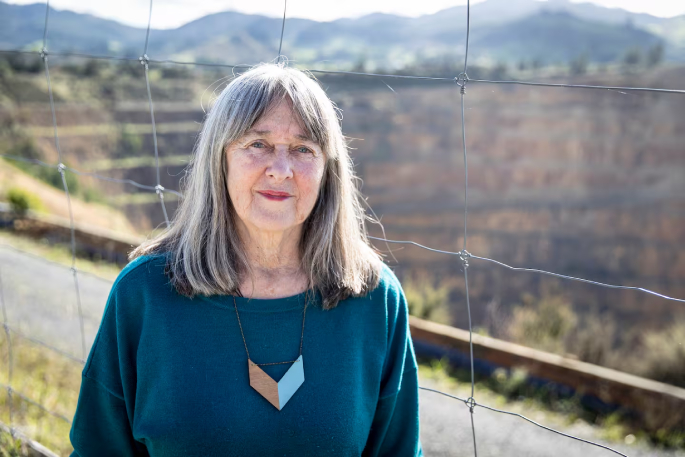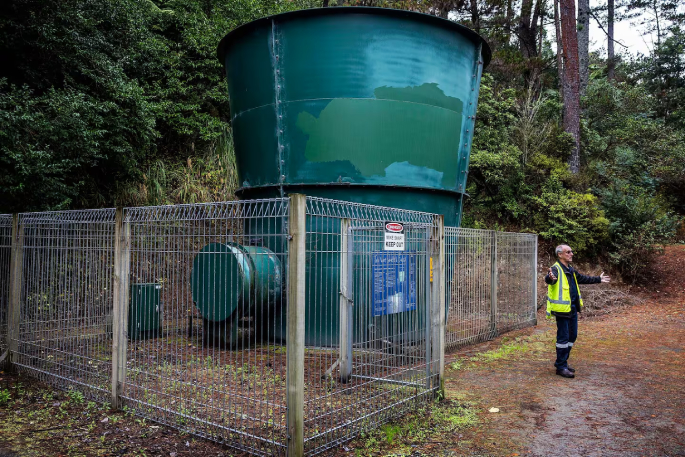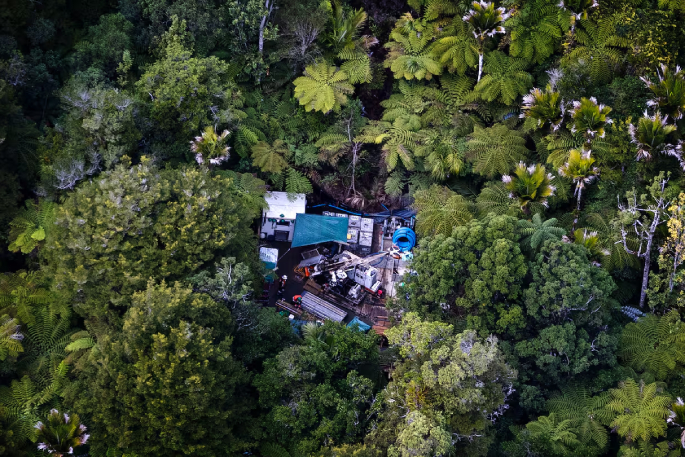A controversial Waikato mining site has the Government’s green light of approval, but an anti-mining environmental group will continue its fight to stop underground mine operations from drilling ahead.
OceanaGold’s Waihī North Project is one of 149 projects on the Government’s Bill of Fast-Track Approvals, potentially allowing it to skip environmental, public, and legal hurdles, and speed through consent processes.
The company wants to set up an underground gold and silver mine, north of Waihī beneath Wharekirauponga; a forest park administered by the Department of Conservation.
It’s just the beginning of “another ridiculous gold rush”, said Coromandel Watchdog of Hauraki chairwoman Catherine Delahunty.
The forest is home to the critically endangered native Archey’s Frog, which is only found in Coromandel and King Country.
Delahunty told Waikato Herald the project “should not be a project”, and would cause environmental damage.

Catherine Delahunty, chair of Coromandel Watchdog, at the OceanaGold Waihi Gold Mine. Photo / Michael Craig
“For the Peninsula where we live, underground mining is very problematic and a risk to the environment above it because they blast, it’s massive amounts of vibrations from blasting.
“It’s what people in Waihī have to live with, but now it’ll be underneath the forest where rare species live ... they’ll suck the water out of the forest when draining the mines, that can have a huge effect on flora and fauna.
“What they’re proposing to do is get a whole lot of gold underneath this forest ... we don’t need any more gold above the ground and we don’t need to risk the environment for that.”
She said the project making it on the fast-track list is one of the “least democratic and fair processes” she’s ever heard of, with no questions asked about water use, water quality, or the impacts on species.
“It’s a pointless project that will make OceanaGold richer, but the rest of us poorer."

OceanaGold spokesman Kit Wilson stands next to a vent. Four similar structures would need to be placed on conservation land in the Coromandel, below which would be a tunnel and gold mine. Photo / Mike Scott
Delahunty said job creation did not justify environmental damage.
“These jobs are not worth the price and they aren’t our locals suddenly becoming wealthier, because that hasn’t happened and it won’t."
“The streets should be paved with gold but where is all that wealth? Waihī has remained un-wealthy.”
She’s “very angry” that the fast-track process has “taken away our voice” while they were in the middle of a process, and trying to get more information.
“Now, we don’t even get to raise our issues, put in submissions, or ask some serious questions about the environment.
“That’s all out the window, it’s all gone. The project will go to an expert panel, whoever they might be and probably aren’t connected to this area. We don’t get a voice anymore there is none, it’s extraordinary.”
OceanaGold senior vice-president of legal and public affairs Alison Paul, told Waikato Herald they believe there is an “environmental win-win” in the project.
The win is mining under conservation land and improving forest habitat for plants and animals on the surface simultaneously.
She said they had gathered expert views to understand the potential effects of the mine, including vibrations affecting the frogs. Their records “don’t exist to say with certainty” whether the expected vibration levels would impact them.
“We know that only 0.6% of Archey’s frog habitat within Coromandel will experience vibration above 2mm/second from our activities for a few seconds every day.”
She said there was a range of pests, in high densities, eating the Archey’s frogs and degrading habitats on land above the proposed mine.
“Fast-track is targeted at a more efficient consenting process, but the responsibility will sit with us as the applicant to do the pre-work: good engagement and thorough technical assessments about the environmental effects of the project.
“It is a large project with clear regional and national economic benefits, which is something the Advisory Panel noted in their report.
“We are fortunate that Waihī North already has a long and deep body of technical work and consultation with the community and other stakeholders.”
Delahunty said the Coromandel Watchdog is not giving up, and they will continue to fight.
“We will continue challenging these mining companies coming into our area. We will continue to challenge OceanaGold with the damages to Waihī whenever we can.
“We’ve already done some protesting and we’ll continue to put pressure on the Government, and ask anybody who loves this place to stand up and fight for it.”
Malisha Kumar is a multimedia journalist based in Hamilton. She joined the Waikato Herald in 2023 after working for Radio 1XX in Whakatāne.



2 comments
Great
Posted on 27-10-2024 10:58 | By Angels
We need economic growth , jobs to be created, a future for our children.
If envirometic people had their way farming etc would be destroyed as well.
Great
Posted on 28-10-2024 17:10 | By Scooter Kid
I am not against the greenies but oceana gold provide jobs, pay tax, people pay tax n the cycle goes round. Tax provides dole benefits, school food, social housing etc. If we dont have business then we aren't gonna prosper. Pike River went underground cos of greeies saving snails (I think) n we know where that ended up. Luckily gold doesn't have explosive gasses so lesser risk when mining. Let's think about the wider picture. Oceana are a responsible company in Waihi, compared to some business, in my view.
Leave a Comment
You must be logged in to make a comment.